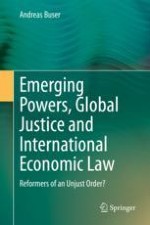2021 | OriginalPaper | Chapter
6. Emerging Powers and International Trade Law
Author : Andreas Buser
Published in: Emerging Powers, Global Justice and International Economic Law
Publisher: Springer International Publishing
Activate our intelligent search to find suitable subject content or patents.
Select sections of text to find matching patents with Artificial Intelligence. powered by
Select sections of text to find additional relevant content using AI-assisted search. powered by
